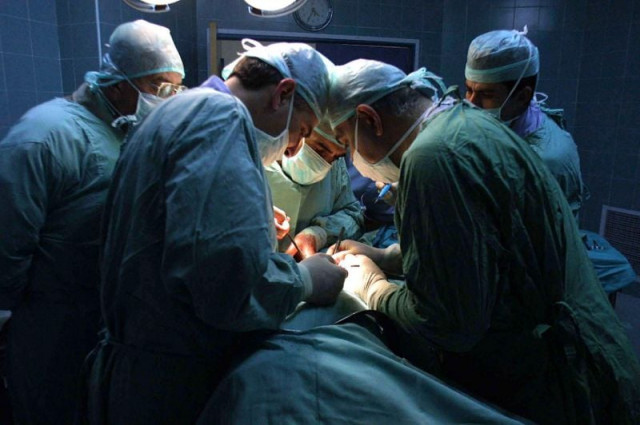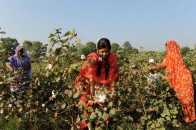For those in need: Donate an organ, save a person’s life
Expert says strong religious narration needed to promote the cause.

PHOTO: AFP
“We need to build a strong religious narration in favour of organ donation because 1.5 million people are in need of urgent kidney transplants. Islamic scholars should come forward to spread awareness about organ donation,” said Shaikh Zayed Hospital Dean Dr Farid Ahmed.
It is a pity that most of the people do not want to donate their organs as they think it is against Islam. “We have to wait for a long time to receive a donor’s kidney which is compatible with the patient’s body. Some have to wait for years to get the transplantation done,” he added.
According to religious scholar Maulana Raghib Naeemi, it is allowed in Islam to donate organs after death and there is no need to set another religious code of conduct under the Shariah law. “Humanity comes first and organs could be donated to save human lives,” he adds.
What is organ donation?
Organs that can be donated include kidney, liver, heart, lung, pancreas and corneas. Organs of those who have passed away can be donated for transplantation, he said. “Those who donate their organs are immortal.”
The Shaikh Zayed Hospital is one of the leading providers of kidney transplant services in government sector hospitals. According to hospital’s data, it has successfully conducted 400 kidney transplants during the last two years.
Illegal trade
The trade of organs is very common in the region. Last year, the Punjab police busted a gang in Rawalpindi for their involvement in kidnapping people whose kidneys were extracted for sale.. “Pakistan has become the hub of illegal trade of kidneys. One the other hand, people are reluctant to voluntarily donate their organs,” said Dr Farid.
Replying to a question, he said their hospital is the only public sector facility that has introduced a code of conduct for organ transplantation. According to it, only blood relatives can donate their kidneys to patients. These outlines help counter the illegal trade in the country, he added.
According to Dr Farid, around 1.5 million people need urgent organ transplantation but despite the state-of-art machinery, they remain helpless due to the unavailability of kidneys and other organs.
Increasing cases of kidney-related diseases
According to medical experts, human kidneys play a crucial role in keeping people alive and well. Kidneys help control blood pressure, produce red blood cells and keep bones healthy.
Mayo Hospital’s Dr Salman Kazmi said that due to hypertension, diabetes and unhealthy lifestyles, people are suffering from kidney-related diseases.
“There are 4,000 hakeems (herbalists) practicing in the city alone, right under the nose of the health department. Hakeem’s kushtay (herbal medicines) that are used to improve male hormones are causing kidney diseases, he said, adding people must avoid visiting quacks.
Major symptoms
Some of the major symptoms of kidney disease are reduced a amount of urine as well as swelling of legs, ankles and feet from retention of fluids caused by the failure of kidneys to eliminate water waste.
Professor Dr Hafiz Shahzad Ashraf, who works as the head of department of urology and kidney transplantation at the Shaikh Zayed Hospital, said more than 20 million people are suffering from kidney-related diseases in Pakistan.
“Most of the people are not aware about the symptoms of kidney diseases and are diagnosed at the stage where kidney transplantation becomes essential,” he said.
The doctor added that in Pakistan, around 20,000 people catch the disease every year and 8,000 to 10,000 people from Punjab visit hospitals with such ailments.
Published in The Express Tribune, March 31st, 2017.



















COMMENTS
Comments are moderated and generally will be posted if they are on-topic and not abusive.
For more information, please see our Comments FAQ